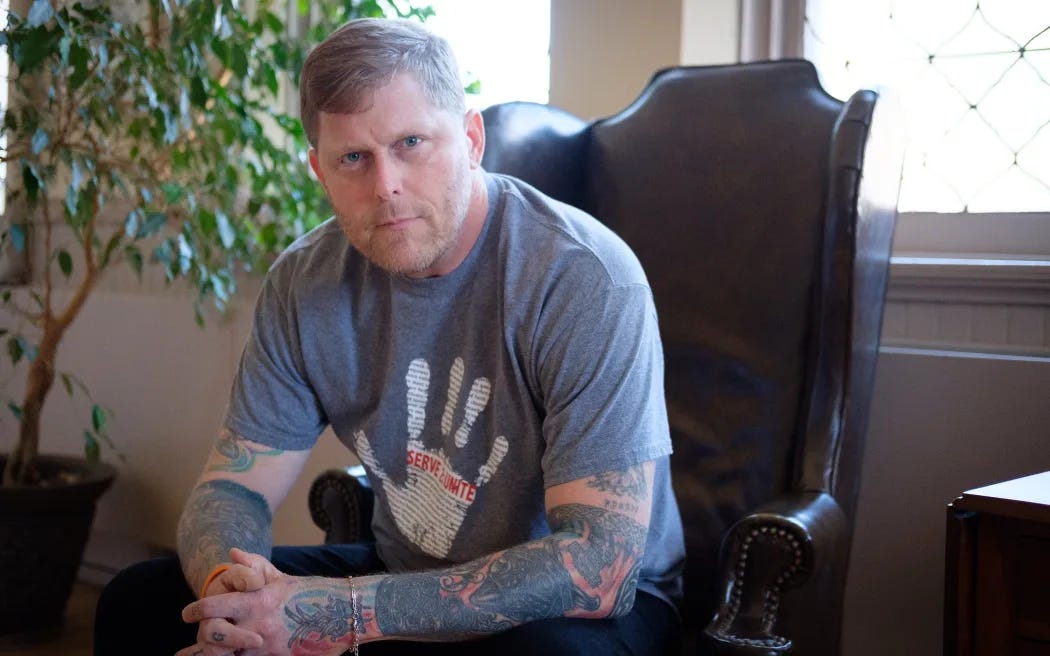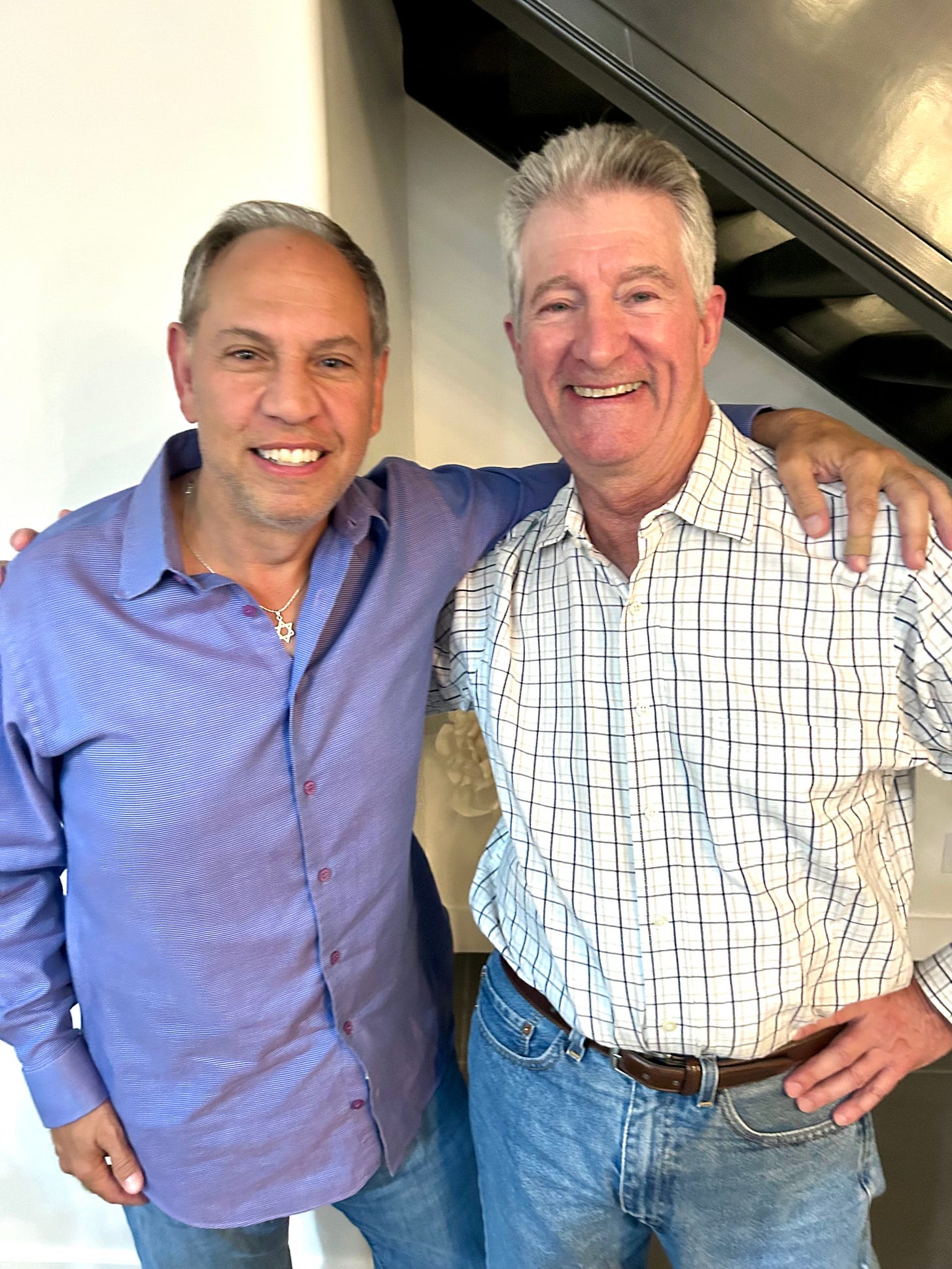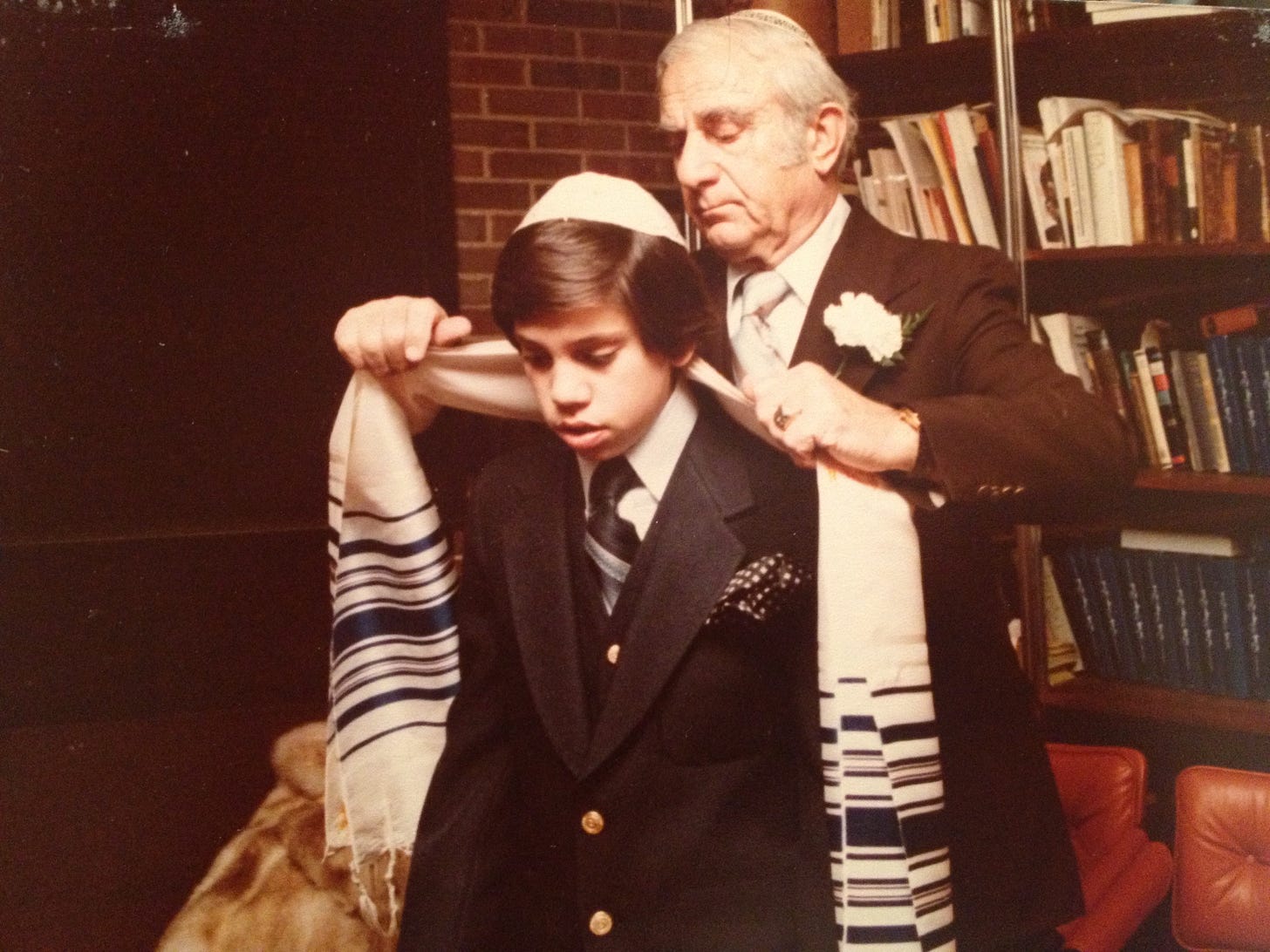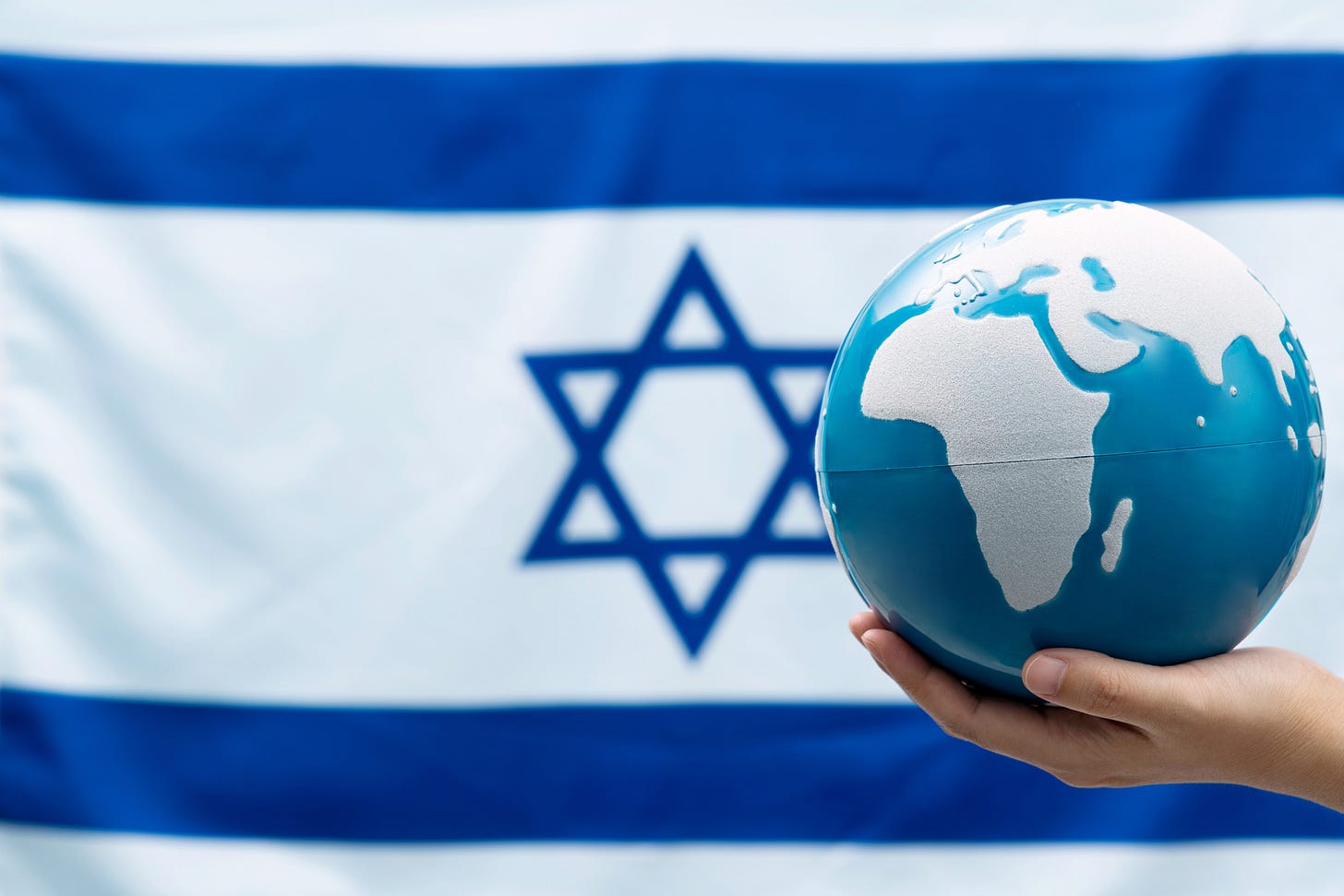What It's Like Being Jewish, What Jews Are Really Like
"After leaving the neo-Nazi movement, Arno grew new eyes — just by opening them: 'I learned that Judaism is essentially about empathy. I get that now, having spent a lot of time with Jewish people.'"
By Michael Golden
I know, it’s a pretty broad headline. And of course, this is my own perspective about being Jewish. But as the editor of JEWDICIOUS, working closely with our 18 founding Jewish columnists over the past year, I’ve learned a lot. I’ve also noticed how my observations are influencing my vision of JEWDICIOUS’s path going forward.
Last year, a newer friend of mine in Arizona invited my mother and me to spend Passover with his family. Marc and his wife, Patrice, hosted about 10 folks to a beautiful Seder dinner: a warm service, stimulating conversation, large laughs and fantastic food. It’s what Jews do. One of the things.
But what was equally lovely about that night was that two of Marc’s guests were not Jewish — and had never experienced a Seder before. Parry’s background was Greek Orthodox, and his wife, Debby, was Irish Catholic. Our hosts, and the rest of us, welcomed this couple to our tradition as if we’d known them for years. Their religion mattered zero. In fact, it was a pleasure for the group to share our special holiday with them. This is also what Jews do. We extend a hand. We welcome. We love. It is our very essence.
The characteristics I described above represent half of an epic irony that has always baffled and frustrated me: While throughout history the Jewish people, and more recently Israelis, have been an overwhelmingly generous and inclusive community, we are often not perceived this way. When you combine this misperception with our unique historical separation and then extend it to its furthest possible negative point, you end up with antisemitism on a massive scale.
While there is no single definitive explanation as to why Jews continue to be viewed so differently and negatively in this modern world, in my view, I believe it is driven by four overarching — and interlocking — factors:
1. Jews make up 0.2% of the world’s 8.1 billion population (two-tenths of 1%). We are outsiders — just mathematically — and always have been. There are tragic reasons for this fact (which Jews are unfortunately obliged to keep reminding the world of), but the bottom line is that we are seen as a tiny minority that is different — because we are.
2. Jews have achieved an outsize level of success across a wide range of fields and disciplines: educational attainment, earnings and investment, charitable giving and philanthropy, Nobel Prize winners (22%), nonfiction Pulitzer Prize winners (50%), Fields Medal honorees (25%), Oscar-winning directors (38%), World Chess Champions (54%), and so on.
That second factor may read as an obnoxiously braggadocious sentence. It is not meant that way; it is a literal fact. Ordinarily, these achievements would be lauded. Alas, not for Jews. Their success is largely resented. This, too, is part of being Jewish. Now, keep in mind (2) as we move to (3).
3. “The Chosen People.” Volumes have been written about this subject, so I’m not about to go deep on it. Basically, in the Torah, in Devarim (Book of Deuteronomy, Chapter 14), it is written that God has chosen the Jews to be a treasured people to Him. They were chosen to enter into a covenant with Him and to uphold His many commandments (there are 613). In doing so, Jews are to be a light unto all nations.
I have Jewish friends who range from those who do not believe in any of the formal tenets of Judaism to those who are unquestioning in their faith of this covenant and who strive to be Torah-observant every hour of every day — to be that light. That example.
To be clear, Judaism welcomes anyone in the world to become Jewish if they have a sincere desire to adopt God’s Commandments and Jewish traditions.
But the concept and phrase “The Chosen People” has long been fraught with hazard. Most speech in the world requires interpretation, and so much of it can be easily misinterpreted or, worse, expropriated to mean something else. If all a person knows about anyone Jewish is that they are part of a tiny, inordinately successful people who often refer to themselves as “The Chosen People,” this can be mistaken for having an air of arrogance. It is not. But politics is perception. And the world we live in is steered by politics.
4. Finally, there is an inescapable principle of psychology that takes the preceding three factors and empowers them to come alive as one: Human beings have a tendency to fear what is different or what they do not understand. It is a maxim proven time and time again in history. Brian Resnick, science editor at National Geographic and Vox, explains it this way:
“It’s our instinct to be distrustful of those whom we perceive as being ‘them’ rather than ‘us.’ In prehistoric times, this is what kept us safe. In the modern age, it’s what nudges us toward bigotry.”
Thus, the irony I mentioned earlier gets even thicker: If you actually know folks who are Jewish, then you understand that they are an overwhelmingly generous people who instinctively want to “welcome the stranger.” As my own editor was working on this, she commented in the margin: “The only time in my life that I felt welcomed into a neighborhood was when we moved into a largely Orthodox neighborhood in Skokie, Illinois.”
There is a reason that this phrase appears in the Torah more times than any other (36). It is part of the covenant. But perhaps even more importantly, it is a lesson that Jews have learned in the hardest way possible through our own history; we know what it’s like to be the stranger.
Recently I interviewed a former neo-Nazi who was a leading force in the white nationalist movement 20 years ago. Arno Michaelis committed a lot of violence upon Jews and Blacks during that time — upon any of “the other.” He has written about how raw anger drives so much of extremist violence:
“People get addicted to the sensation of hating someone else. It’s often a lot easier to do than to take a look at yourself.”

Toward the end of our conversation, Michaelis distilled down the very irony I’m describing:
“Jews not only didn’t reject me for my stint as a white nationalist, but they amplified my story and helped me tell it. And these are the people I turn to when I need help. And that’s a big part of my message when I talk to people who are antisemitic, first, do you know any Jews? Have you known any Jews in your life?”
Sounds pretty straightforward, no? Not a chance. Not in this world. If you’re one of the 99.8% of people in the world who aren’t Jewish — and you haven’t really had any meaningful experience or contact with Jews — how would you know what kind of people they are? How could you know?
All of this brings me to JEWDICIOUS and the dear readership that you are a part of and which has grown exponentially since our launch 16 months ago. In its infancy, I outlined the parameters or our writing as pretty broad. Our 18 Jewish writers could write about anything; it did not have to be about religion or Jewishness or Israel. I believed that the stories our “Scribe Tribe” would tell would have a distinct flavor due to our common Jewish background. And I wanted the focus of our content to develop organically. It was the opposite of the strategy you would employ for a startup company, and that’s because this is not a company — it is a labor of love. For all of us.
But what I noticed early on was that nearly every writer did want to write about the Jewish world or how their Jewishness played a unique role in their lives. And very often, the points they were making were not exclusive to Jewish readers — they were universal themes. “Gold, Jerry, Gold.”
The wonderful upshot of the route that JEWDICIOUS has been traveling is that it has attracted a great number of non-Jewish readers. And as the guy who receives all of the reader feedback directly through our platform on Substack, I am thrilled when I hear folks tell me that they’re grateful for the way we break down issues and the Jewish world. That we’ve demystified something about Jewishness or Jewish history and changed the way they look at it. Changed the way they look at us.
When I was an 18-year-old freshman at Indiana University, the star quarterback for the Hoosiers lived two doors down in my dorm. His name was Dave Schnell, and his roommate was his twin brother, Doug. I became fast friends with them, and we’d all play cards together till the early morning hours. Dave’s girlfriend, Kim, who was from the same small Indiana town as the brothers, walked up to me one day and said:
“So I’ve never met a Jew before. What’s the deal?”
I don’t remember exactly what I said, but I remember feeling defensive. Because I thought it sounded offensive.
Today, I’d like to think that if someone came up to me and said what Kim said, I’d take it in stride and enlighten or inspire them by describing the essential beauty of what being Jewish means — far beyond the survival part, the core of who we are as a people.
I’m not saying that every piece JEWDICIOUS columnists will specifically address will be about what being Jewish means to them. But I am saying that we have already built a track record on that score, and I will most certainly be encouraging all of us to keep telling those kinds of stories. It is forefront in my mind.
There is zero downside to having more folks within that 99.8% of the world getting to know the Jewish people better. By and large, the ones who do are delightfully surprised. The upside is incalculable.
On behalf of all of the writers, editors and advisers on our JEWDICIOUS team, we sincerely thank you for reading, commenting and sharing our words and ideas. May we never stop learning from one another.
MICHAEL GOLDEN is the Editor-In-Chief of JEWDICIOUS and founder of The Golden Mean.
From navigating the nuances of family and relationships to unpacking history and politics to finding the human angle on sports and entertainment — plus our unsparing take on what’s happening in the Jewish world — the canvas at JEWDICIOUS is limitless!







